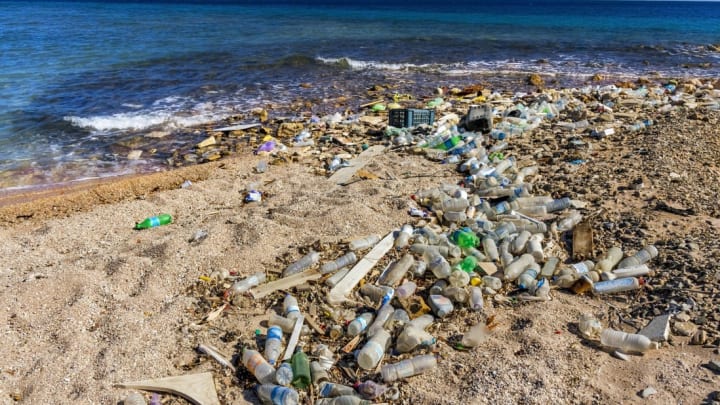In 2016, Japanese researchers discovered a type of bacteria that eats non-biodegradable plastic. The organism, named Ideonella sakaiensis, can break down a thumbnail-sized flake of polyethylene terephthalate (PET), the type of plastic used for beverage bottles, in just six weeks. Now, The Guardian reports that an international team of scientists has engineered a mutant version of the plastic-munching bacteria that's 20 percent more efficient.
Researchers from the U.S. Department of Energy's National Renewable Energy Laboratory and the University of Portsmouth in the UK didn't originally set out to produce a super-powered version of the bacteria. Rather, they just wanted a better understanding of how it evolved. PET started appearing in landfills only within the last 80 years, which means that I. sakaiensis must have evolved very recently.
The microbe uses an enzyme called PETase to break down the plastic it consumes. The structure of the enzyme is similar to the one used by some bacteria to digest cutin, a natural protective coating that grows on plants. As the scientists write in their study published in the journal Proceedings of the National Academy of Sciences, they hoped to get a clearer picture of how the new mechanism evolved by tweaking the enzyme in the lab.
What they got instead was a mutant enzyme that degrades plastic even faster than the naturally occurring one. The improvement isn't especially dramatic—the enzyme still takes a few days to start the digestion process—but it shows that I. sakaiensis holds even more potential than previously expected.
"What we've learned is that PETase is not yet fully optimized to degrade PET—and now that we've shown this, it's time to apply the tools of protein engineering and evolution to continue to improve it," study coauthor Gregg Beckham said in a press statement.
The planet's plastic problem is only growing worse. According to a study published in 2017, humans have produced a total of 9 billion tons of plastic in less than a century. Of that number, only 9 percent of it is recycled, 12 percent is incinerated, and 79 percent is sent to landfills. By 2050, scientists predict that we'll have created 13 billion tons of plastic waste.
When left alone, PET takes centuries to break down, but the plastic-eating microbes could be the key to ridding it from the environment in a quick and safe way. The researchers believe that PETase could be turned into super-fast enzymes that thrives in extreme temperatures where plastic softens and become easier to break down. They've already filed a patent for the first mutant version of the enzyme.
[h/t The Guardian]
